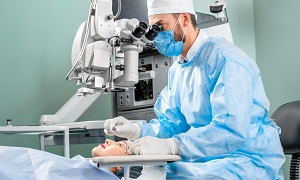Best Doctors in India for Diabetic Retinopathy Treatment
- Opthalmologist, Chennai, India
- Over 26 years’ experience
- Apollo Hospitals Greams Road, Apollo Spectra Hospital Chennai-Alwarpet
Profile Highlights:
- Dr. Pratik Ranjan Sen is a specialist in Ophthalmology and serves as an Ophthalmologist – Consultant at Apollo Hospitals, Chennai.
- He has performed over 8000 Retinal detachment and other Vitreo retinal disorder surgeries.
- Dr. Pratik Ranjan Sen considers his profession a mission and is dedicated to his work. Due to this, he has gained enough trust and recommendations from his patients.
- Ophthalmologist, Chennai, India
- Over 21 years’ experience
- Apollo Hospitals Greams Road
Profile Highlights:
- Dr. Viswanathan P is one of the best eye surgeons in India having an overall experience of 21 years.
- He is a qualified doctor from the Tamil Nadu University of India and possesses a degree in MBBS and MS.
- One can visit him for routine eye check-ups or retina examinations and services like eye surgery, retina surgery, cataract surgery, etc.
- Ophthalmologist, Gurugram, India
- Over 13 years’ experience
- Medanta-The Medicity, Gurgaon
Profile Highlights:
- Dr. Svati Bansal is an esteemed consultant and practitioner of ophthalmology in Gurugram.
- Her specialty lies in orbit and oculoplasty, ocular oncology, ocular trauma, and neuro-ophthalmology.
- She has fellowships in neuro-ophthalmology and ocular motility, oculoplasty, and facial aesthetics, and ocular oculoplastic and ocular oncology.
- Top Ophthalmologist | Fortis Hospital, Mulund, Mumbai
- 10+ Years Experience
- Fortis Hospital Mulund Mumbai
Profile Highlights:
- Dr. Amit Jain is an experienced Ophthalmologist based in Mumbai, who specializes in treating patients with eye issues, particularly those related to Vitreo-Retina, Uvea, and ROP.
- He is an expert in employing the most recent techniques in eye surgery to address conditions like diabetes that damage the eyes and correct issues with the back of the eye.
- With more than 10 years of expertise, Dr. Amit Jain has made a name for himself as a leading expert in the field of eye care.
- He completed his medical training in Ophthalmology at the Dr. Rajendra Prasad Centre for Ophthalmic Sciences at AIIMS in New Delhi, a renowned institute for eye treatment. Later, he went on to pursue long term clinical fellowship in Vitreoretina at Sanskara Netralaya in Kolkata and Chennai.
- He started his professional career at Shri Ganapati Netralaya in Jalna, Maharashtra as an Associate Consultant in the department of Vitreoretina and Uvea services. And now, he serves as a Consultant in the Department of Ophthalmology at Fortis Hospital, Mulund.
- Apart from being a medical practitioner, Dr. Jain also enjoys imparting information and knowledge among young minds. He mentors aspiring medical professionals who wish to focus on eye care.
- Several of his works on the topic of eyes have been published in prestigious medical publications. Additionally, he often speaks at medical conferences where eye specialists from throughout the nation get together to exchange knowledge.
Best Hospitals in India for Diabetic Retinopathy Treatment
Hospital Highlights:
- Apollo Hospitals is a private healthcare group in India, with its headquarters based in Chennai. Established in 1983 by Dr. Prathap C. Reddy, the group offers a wide range of medical treatments and services across various specialties.
- It is renowned for emphasizing innovation and utilizing cutting-edge medical technologies into patient treatment.
- Known as India’s first corporate hospital, Apollo Hospitals is often credited for pioneering the private healthcare revolution in the country.
- With clinics and hospitals located all throughout India, Apollo Hospitals is a nationwide healthcare organization. Its presence can also be found in foreign countries.
- Preventive health examinations, medical and surgical treatment, and diagnostic centres are just a few of the services that the Apollo group provides.
- The group has several centres of expertise, including Cardiac Sciences, Neurosciences, Orthopedics, Emergency Care, Cancer Care, and Organ Transplantation.
- City: Chennai, India
Hospital Highlights:
- RIMC is a multi-specialty hospital in a sprawling area of 36 acres located in Chromepet, Chennai, Tamil Nadu, India.
- The facility has 450 beds including 130 critical care beds, 9 operating rooms, modern reference laboratories and radiology services, and is conveniently located near road, rail and air transportation.
- RIMC is led and managed by world-renowned physicians committed to healthcare.
- RIMC offers the broadest range of clinical care, education, and research. The hospital offers state-of-the-art technology and modern treatment facilities designed to provide health care at an affordable cost.
- Rela Institute is driven by patient needs, comfort and confidence.
- City: New Delhi, India
Hospital Highlights:
- Fortis Hospital in Shalimar Bagh is a multi-super specialty hospital that strives to provide world-class patient care by leaving no stone unturned.
- Fortis, Shalimar Bagh, with 262 beds and a 7.34-acre footprint, provides the best level of medical care through its team of doctors, nurses, technicians, and management professionals.
- City: Bengaluru, India
Hospital Highlights:
- Established in 2007, the Apollo Hospitals Bangalore is a 300-bed multispecialty hospital situated in Bannerghatta Road, Bangalore.
- Equipped with the state-of-the-art technology, it is a leading hospital dedicated to providing healthcare needs to patients with compassion and expertise.
- It is the first hospital to have completed the highest number of Robot Assisted Heart Surgeries in India.
- Over the years, it has successfully conducted some of the rarest medical procedures such as spinal angiolipoma excision, autologous chondrocyte implantations, and tibial tuberosity shift with MPSL reconstruction.
- The Apollo Hospitals Bangalore has the reputation of performing the greatest series of airway stents in the country.
- Additionally, the hospital is known for providing comprehensive treatment in specialties such as gastroenterology, urology, gynecology, oncology, colorectal surgery, etc.
- The “The Minimal Access Surgery Centre” (MASC), one of Apollo Hospitals, Bangalore’s premier Centres of Excellence, is devoted to the use of minimally invasive surgical procedures.
- In 2013, THE WEEK-A C Nielsen, Best Hospital Survey ranked Apollo Hospitals Bangalore as the 2nd best multi-speciality hospital in Bangalore.
- City: Mumbai, India
Hospital Highlights:
- Gleneagles Global Hospital The 450-bed facility comprises of 17-stories, housing state-of-the-art infrastructure, and advanced medical care facilities.
- The hospital offers end-to-end clinical, surgical, and diagnostic services. It is equipped with a team of eminent medical professionals aided by qualified nurses and medical staff
- The Hospital offers advanced Endoscopic procedures, Hepatobiliary and Liver Surgeries, Surgical and Medical Gastroenterology, Bariatric Surgery, and Robotic surgery.
- The hospital is a center of excellence for Orthopedics, Joint Replacement, Knee Replacement, and Hip Replacement surgery.
- City: Hyderabad, India
Hospital Highlights:
- CARE Hospitals were established in the year 2000, by CARE Group.
- The multispecialty hospital has 435 beds, including 120 critical care beds, with an annual inflow of 180000 outpatients and 16,000 in-patients.
- The hospital provides specialty medical services in Cardiology, Cardiothoracic Surgery, Pediatric Cardiology, Pediatric Cardiothoracic Surgery, Neurology, Neurosurgery, Nephrology, and Urology.
- The hospital has the first dual source, 128 slice CT scanner (for high precision cardiac imaging) – the first of its kind in south India.
- The hospital offers a wide range of accommodation facilities for the convenience of its varied patient base, ranging from general wards to super deluxe rooms.
- City: Mumbai, India
Hospital Highlights:
- Fortis Hospital in Mulund is a 315-bed multi-speciality tertiary care hospital with five JCI accreditations that offers a wide variety of diagnostic and treatment services. The Fortis Hospital in Mulund delivers patient-centred treatment with cutting-edge technology, highly skilled and experienced surgeons, and paramedical staff.
- This institution houses Maharashtra’s largest multi-organ transplant centre. It is also the first heart transplant centre in western India to conduct 100 or more consecutive heart transplants in under four years. It is the only hospital in the city to have multi-organ transplants and has handled the youngest patient for angioplasty. Fortis Hospital Mulund now boasts the first advanced surgical robot in central Mumbai.
- Cardiology and heart surgery, urology, nephrology, neurosciences, orthopaedics, digestive care, emergency and critical care, and maternity care are among the services provided by the hospital.
- City: New Delhi, India
Hospital Highlights:
- Manipal Hospitals, Dwarka, is a super-specialty hospital in Dwarka, New Delhi, which is a part of Manipal Hospitals Group.
- The hospital aims to provide the best treatment on par with international standards at a fraction of the cost.
- Equipped with 380 beds, the hospital is also one of the new age hospitals which are equipped fully with state-of-the-art infrastructure, cutting-edge technology as well as the latest and advanced clinical practices. The hospital also has 13 modular Operation theatres with 118 beds which are solely meant for critical care.
- The hospital comprises internationally acclaimed doctors and highly professional and experienced hospital and medical staff who are able to provide preventive, therapeutic, and diagnostic services all under one roof.
- City: Chennai, India
Hospital Highlights:
- Located in Chennai, India, MGM Healthcare is a top multispecialty hospital that provides all medical services under one roof.
- Since its founding in 2019, MGM Healthcare has quickly become a leading national referral centre, creating several innovative flagship initiatives.
- MGM Healthcare combines next-generation medical and digital technologies to provide better patient results.
- With 12 centres of excellence, more than 400 inpatient beds, 100 intensive care unit beds, and 24/7 emergency care, MGM Healthcare leaves no chance in redefining the patient experience in Chennai.
- MGM Healthcare boasts 250+ expert doctors across 30+ departments, including Cardiology, Pulmonology, Neurology, Obstetrics & Gynaecology, and more.
- They house 12 specialized Centres of Excellence, including Neurosciences, Orthopaedics, and Multi-Organ Transplantation.
- Their team of doctors, nurses, and paramedics works together to give every patient individualized treatment.
Hospital Highlights:
- Lilavati Hospital & Research Centre is India’s premier multi-speciality tertiary care hospital and has been recognised as a global medical excellence centre.
- Lilavati Hospital & Research Centre has built an unrivalled level of trust with its patients over the years, thanks to a solid foundation that comprises cutting-edge facilities, the best medical competence, research, education, and charity endeavours.
- The hospital is quite proud of the fact that it now serves patients from all kinds of backgrounds, not just from the United States but from all around the world.
- The hospital has a total of 323 beds, one of the largest Intensive Care Units (ICUs), 12 Operation Theatres with modern amenities, over 300 consultants, and almost 1,800 personnel.
DIABETIC RETINOPATHY
Diabetic retinopathy is a condition that occurs due to damage to the blood vessels of the retina in people suffering from diabetes. If you have type 1 or type 2 diabetes, and a long history of uncontrolled blood sugar levels, you might develop diabetic retinopathy.
Though the condition generally starts with a mild vision loss, eventually you might even lose your sight. Diabetic retinopathy is known to be the most common eye disease among people who suffer from diabetes.
Symptoms
Although you might not have any symptoms in the early stages of diabetic retinopathy, as the condition progresses, some of the symptoms might include:
- Blurred vision
- Fluctuating vision
- Floaters
- Dark or empty areas in your vision
- Impaired color vision
- Vision loss
This condition is known to generally affect both eyes. If you are suffering from diabetes, managing it carefully is one of the best ways to prevent loss of vision. Even if your vision seems fine, see your eye doctor once every year for an examination.
Pregnancy might also worsen diabetic retinopathy, and therefore if you are pregnant, additional eye exams might be recommended by your doctor.
If your vision changes suddenly or becomes blurry, spotty, or hazy, then contact your eye doctor right away.
Causes & risk factors
High levels of sugar in your blood over long periods can lead to diabetic retinopathy. The excess sugar causes damage to the blood vessels supplying your retina with blood. High blood pressure is a risk factor, as well, for retinopathy.
The retina is a layer of tissue in the back of your eye, which helps to change the images that the eye sees into nerve signals so that the brain can understand them. When the retina’s blood vessels undergo any damage, they can get blocked. This cuts off some of the blood supply of the retina. This loss of blood flow can even lead to other, weaker blood vessels to grow and these new blood vessels may leak and also create scar tissue which can lead to loss of vision.
The longer you suffer from diabetes, the higher are your chances of developing diabetic retinopathy. People who suffer from diabetes for over thirty years generally show signs of retinopathy. Managing your diabetes can generally slow the progression.
Although any person with diabetes is at risk of diabetic retinopathy, the risk becomes higher if the person:
- Has uncontrolled blood sugar levels
- Has high cholesterol
- Has high blood pressure
- Is suffering from diabetes for a very long time
- Is pregnant
- Smokes regularly
Diagnosis
Eye exam
- Scarring
- Leaking of the blood vessels
- Blocked blood vessels
- Changes to the lens
- Retinal detachment
- Damage to the nerve tissue
Fluorescein angiography test
They may also perform a fluorescein angiography test, which involves injecting a dye into your arm, which allows them to track how the blood flows in your eye. They will need to take pictures of the dye circulating inside your eye so that they are able to determine which vessels are blocked, leaking, or broken.
OCT exam
An OCT (optical coherence tomography) exam might be used as well. It uses light waves in order to produce images of the retina. These images let your doctor determine the thickness of your retina and let him/her known if any fluid has accumulated in it.
Treatment
For people suffering from early diabetic retinopathy, treatment options are limited. Your doctor might want to perform regular eye exams, in order to monitor the eye health just in case, treatment becomes necessary. An endocrinologist can also help you slow the progression of the condition by helping you manage your diabetes.
For people suffering from advanced diabetic retinopathy, the treatment options depend on the type and severity of the condition. Treatment can be of various types.
Photocoagulation surgery
Scatter photocoagulation
Scatter photocoagulation is a method that involves using a laser to burn hundreds of tiny holes in the eyes so that the risk of blindness is reduced.
Focal photocoagulation
Focal photocoagulation, meanwhile, involves using a laser to target a specific leaky vessel in the macula so that macular edema doesn’t worsen.
Vitrectomy
Vitrectomy is another method of treatment that involves removing scar tissue and cloudy fluid from the vitreous fluid of the eye.
Complications
If left untreated, diabetic retinopathy might lead to several complications.
When blood vessels bleed into the vitreous, the main jelly that fills the eye, this is called vitreous hemorrhage. The symptoms include floaters, in mild cases, but in severe cases, symptoms can include vision loss, as the blood in the vitreous blocks any light from entering the eye. If the retina remains undamaged, then the bleeding in the vitreous is able to resolve itself. In some cases, diabetic retinopathy might even cause a detached retina. This complication can happen if scar tissue pulls the retina away from the back of the eye.
The abnormal blood vessels which are associated with this condition stimulate the growth of scar tissue as well, which can pull the retina away from the back of the eye. This is known as retinal detachment. This can cause spots floating in your vision, flashes of light, or in some cases, severe vision loss.
In some cases, blood vessels might grow in the front part of your eye, and this might interfere with the normal flow of fluid out of the eye, causing pressure in the eye to build up. This is known as glaucoma. This pressure can damage the nerve carrying images from your eye to your optic nerves.
Diabetic retinopathy, glaucoma, or a combination of both can lead to you losing your vision completely.
Prevention
Diabetic retinopathy can’t be always prevented. However, regular eye examinations, as well as proper control of your blood sugar and blood pressure, as well as an early intervention for vision problems can help to prevent severe vision loss.
If you smoke or use any other kind of tobacco, quitting is the best way to prevent diabetic retinopathy. Ask your doctor if you need help in quitting.
















